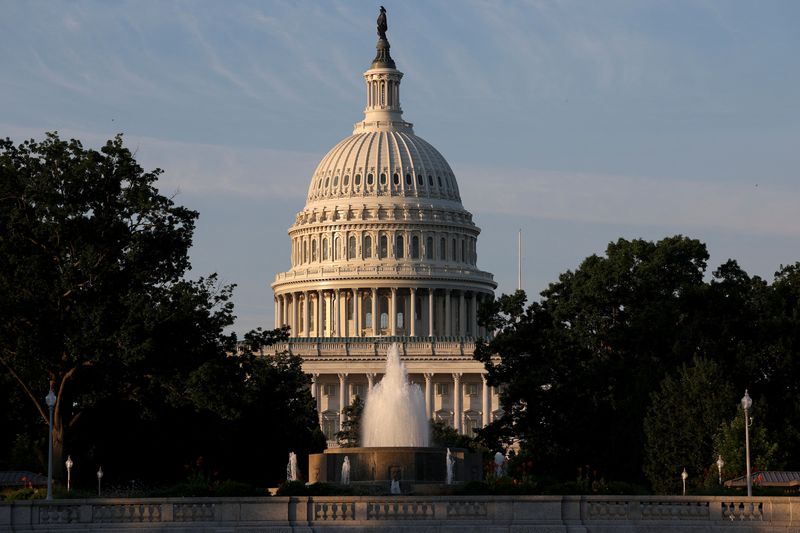US House Republicans head toward final vote on Trump’s sweeping tax-cut bill

By Bo Erickson, Richard Cowan and David Morgan
WASHINGTON (Reuters) -Republicans in the U.S. House of Representatives advanced President Donald Trump’s massive tax-cut and spending bill toward a final yes-or-no vote early on Thursday morning, appearing to overcome internal party divisions over its cost.
During a marathon overnight session, lawmakers cleared a final procedural hurdle needed to begin debate on the bill in a 219-213 vote at around 3:30 a.m. ET (0730 GMT). It was not clear when they would hold a final vote.
As dawn broke in Washington, the top House Democrat, Hakeem Jeffries, was well into what was turning into an hours-long speech, calling out Republican lawmakers by name as he blasted the package as a giveaway to the wealthiest Americans.
“This one big, ugly bill–this reckless Republican budget — this disgusting abomination is not about improving the quality of life of the American people,” he said, a scathing reference to Trump’s name for his signature legislation: One Big Beautiful Bill.
“The focus of this bill, the justification for all of the cuts that will hurt everyday Americans is to provide massive tax breaks for billionaires.”
His remarks had echoes of Democratic Senator Cory Booker’s record-setting April speech that accused Trump of “recklessly” challenging the nation’s democratic institutions.
Democrats are united in opposition to the bill, but on their own lack the votes to stop the bill in the chamber, which is controlled 220-212 by Trump’s Republicans.
Republicans can afford no more than three defections to get a final bill passed.
The past two weeks have shown deep Republican divides on the bill, which would add $3.4 trillion to the nation’s $36.2 trillion in debt and make major cuts to social programs including Medicaid.
Republican lawmakers have long railed against the growth of the debt, which has continued over the past two decades regardless of which party was in control in Washington.
A handful of Republican holdouts have objected to the bill. One, Senator Thom Tillis, opted not to seek re-election after voting against it. Nonetheless, Trump has succeeded in getting the votes to advance the legislation at each step of the way.
Votes in the House were held open for hours on Wednesday during the day and overnight as House Speaker Mike Johnson and the White House talked with reluctant members.
Johnson expressed optimism on Wednesday night, saying lawmakers had a “long, productive day” discussing the issues. He praised Trump for making phone calls to the holdouts through the early hours of Thursday morning.
“There couldn’t be a more engaged and involved president,” Johnson told reporters.
SENATE PASSAGE
The Senate passed the legislation by the narrowest possible margin on Tuesday after intense debate on the bill’s hefty price tag and $900 million in cuts to the Medicaid healthcare program for low-income Americans.
Any changes made by the House would require another Senate vote, which would make it all but impossible to meet Trump’s self-imposed deadline of getting the legislation approved by the July 4 holiday.
The bill would raise the nation’s debt ceiling by $5 trillion, a necessary step to avoid a devastating default later this summer.
The nonpartisan Congressional Budget Office estimates that almost 12 million people could lose health insurance as a result of the bill.
The legislation contains most of Trump’s top domestic priorities.
It would extend Trump’s 2017 tax cuts, cut health and food safety net programs, fund Trump’s immigration crackdown, and zero out many green-energy incentives. It also includes a $5 trillion increase in the nation’s debt ceiling, which lawmakers must address in the coming months or risk a devastating default.
(Reporting by Bo Erickson, Richard Cowan and David MorganWriting by Andy SullivanEditing by Scott Malone and Frances Kerry)









